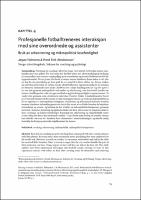Chapter 4 Profesjonelle fotballtreneres interaksjon med sine overordnede og assistenter
| dc.contributor.author | Holmemo, Jørgen | |
| dc.contributor.author | Abrahamsen, Frank Erik | |
| dc.contributor.author | Holmemo, Jørgen | |
| dc.contributor.author | Abrahamsen, Frank Eirik | |
| dc.date.accessioned | 2018-07-27 11:59:17 | |
| dc.date.accessioned | 2020-04-01T12:33:28Z | |
| dc.date.available | 2020-04-01T12:33:28Z | |
| dc.date.issued | 2018 | |
| dc.identifier | 1000333 | |
| dc.identifier | OCN: 1076788412 | en_US |
| dc.identifier.uri | http://library.oapen.org/handle/20.500.12657/29599 | |
| dc.description.abstract | "Research on coaching in sports has long been concerned with how coaches interact with their players. In recent years, more research in sports psychology has been conducted on the coach’s role. However, research on coaches’ co-operation with leaders and staff in the clubs has received little attention. There is reason to argue that the way coaches handle this part of their profession can have a huge impact on how well they are able to do their job. This study explores how three experienced Norwegian elite football coaches (average 25 years of elite experience) interact with others in their clubs creating room for themselves and achieving their goals through micro-political activity and orchestration, i.e. coaches’ actions to increase their own influence and power within the organization. We collected data through semi-structured interviews. Then we used content analysis based on a theoretical framework consisting of the orchestration metaphor and studies on micropolitics and the three aspects of micropolitical proficiency. The results and discussion describe how the coaches handle the negotiation process before joining a club, how they handle managers and employees, and how they have developed their micropolitical skills through their careers. Their knowledge about and attention to these processes were integral parts of their coaching and leadership challenges. Knowledge of orchestration and micropolitics seemed to be important for the coaches in the current study. We therefore provide some suggestions as to how coaches can improve their ability to handle these elements in coach education and suggest possible future research and applied implications for coaches." | |
| dc.language | Norwegian | |
| dc.subject.classification | thema EDItEUR::J Society and Social Sciences::JM Psychology | en_US |
| dc.subject.other | coaching | |
| dc.subject.other | orchestration | |
| dc.subject.other | micro-policies | |
| dc.subject.other | micro-political literacy | |
| dc.subject.other | coaching | |
| dc.subject.other | orkestrering | |
| dc.subject.other | mikropolitikk | |
| dc.subject.other | mikropolitisk kompetanse | |
| dc.title | Chapter 4 Profesjonelle fotballtreneres interaksjon med sine overordnede og assistenter | |
| dc.type | chapter | |
| oapen.abstract.otherlanguage | "Forskning på coaching i idrett har lenge vært opptatt av hvordan trenere samhandler med sine spillere. De siste årene har det blitt utført mer idrettspsykologisk forskning på trenerrollen, men treneres samhandling med overordnede og ansatte i klubbene har fått lite oppmerksomhet. Det er grunn til å hevde at måten trenere håndterer denne delen av sitt yrke på, kan ha stor innvirkning på hvor godt de er i stand til å utføre jobben sin. Denne studien går i dybden på hvordan tre erfarne norske elitefotballtrenere (gjennomsnittlig 25 års erfaring på elitenivå) samhandler med andre i klubbene for å skape handlingsrom for seg selv og for å nå sine mål gjennom mikropolitisk virksomhet og orkestrering, som kort fortalt handler om treneres handlinger for å øke sin egen innflytelse og påvirkningsmulighet i organisasjonen. Vi samlet data gjennom semi-strukturerte intervjuer. Deretter brukte vi innholdsanalyse basert på et teoretisk rammeverk bestående av orkestreringsmetaforen og studier på mikropolitikk og de tre aspektene av mikropolitiske ferdigheter. Resultatene og diskusjonen beskriver hvordan trenerne håndterer forhandlingsprosessen før de blir ansatt av en klubb, hvordan de håndterer overordnede og ansatte, og hvordan de har utviklet sin mikropolitiske kompetanse gjennom karrieren. Trenernes kunnskap og oppmerksomhet om disse prosessene var integrerte deler av deres coaching- og ledelsesutfordringer. Kunnskap om orkestrering og mikropolitikk syntes å være viktig for dem i den nåværende studien. Vi gir derfor noen forslag til hvordan trenere kan forbedre sin evne til å håndtere disse elementene i trenerutdanningen, og foreslår mulig fremtidig forskning og anvendte implikasjoner for trenere." | |
| oapen.identifier.doi | 10.23865/noasp.39.ch4 | |
| oapen.relation.isPublishedBy | bf7b42a4-6892-42e3-aaf8-8f32c8470a8b | |
| oapen.relation.isPartOfBook | 387ce5c2-7055-4af1-99b5-973279fb12bb | |
| oapen.relation.isbn | 9788202596903 | |
| oapen.pages | 30 | |
| oapen.place.publication | Oslo | |
| oapen.identifier.ocn | 1076788412 |

